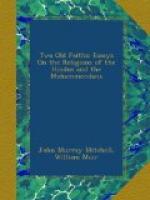[Sidenote: The deities are “the bright ones,” according to the language of the sacred books of India.] The Sanskrit word for god is deva, which means bright, shining. Of physical phenomena it was especially those connected with light that enkindled feelings of reverence. The black thunder-cloud that enshrouded nature, in which the demon had bound the life-giving waters, passed away; for the glittering thunder-bolt was launched, and the streams rushed down, exulting in their freedom; and then the heaven shone out again, pure and peaceful as before. But such a wonder as the dawn—with far-streaming radiance, returning from the land of mystery, fresh in eternal youth, and scattering the terrors of the night before her—who could sufficiently admire? And let it be remembered that in the Hindu mind the interval between admiration and adoration is exceedingly small. Yet, while it is the dawn which has evoked the truest poetry, she has not retained the highest place in worship.
[Sidenote: Fire much worshiped.] No divinity has fuller worship paid him than Agni, the Fire (Ignis). More hymns are dedicated to him than to any other being. Astonishment at the properties of fire; a sense of his condescension in that he, a mighty god, resides in their dwellings; his importance as the messenger between heaven and earth, bearing the offerings aloft; his kindness at night in repelling the darkness and the demons which it hides—all these things raised Agni to an exalted place. He is fed with pure clarified butter, and so rises heavenward in his brightness. The physical conception of fire, however, adheres to him, and he never quite ceases to be the earthly flame; yet mystical conceptions thickly gather round this root-idea; he is fire pervading all nature; and he often becomes supreme, a god of gods.
[Sidenote: Soma highly exalted. Soma becomes a very mighty god.] All this seems natural enough; but one is hardly prepared for the high exaltation to which Soma is raised. Soma is properly the juice of a milky plant (asclepias acida, or sarcostemma viminale), which, when fermented, is intoxicating. The simple-minded Aryas were both astonished and delighted at its effects; they liked it themselves; and they knew nothing more precious to present to their gods. Accordingly, all of these rejoice in it. Indra in particular quaffs it “like a thirsty stag;” and under its exhilarating effects he strides victoriously to battle. Soma itself becomes a god, and a very mighty one; he is even the creator and father of the gods;[3] the king of gods and men;[4] all creatures are in his hand. It is surely extraordinary that the Aryas could apply such hyperbolical laudations to the liquor which they had made to trickle into the vat, and which they knew to be the juice of a plant they had cut down on the mountains and pounded in a mortar; and that intoxication should be confounded with inspiration. Yet of such aberrations we know the human mind is perfectly capable.




